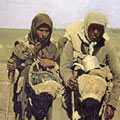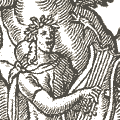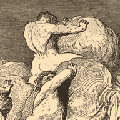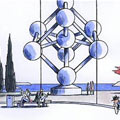mijn hele vriesvak leeg
 “(Her)kent u die uitdrukking? Of zoals sommige mensen wel eens zeggen… Ik moest daaraan denken toen…” zo begon ds. Gremdaat altijd zijn fijne televisiecolumn waarbij hij ons moed insprak. Ik moest weer eens aan hem denken, toen ik in de krant bovenstaande oneliner las. Typisch een uitdrukking uit het therapeutische circuit waarbij ik dan onmiddellijk moet denken aan die vriesbox met ingevroren hart die ik wel eens zag in een documentaire over harttransplantatie. Tranen ontdooien het ingevroren hart, maken weer warmbloedig en levend. Hete tranen zorgen voor het beste resultaat.
“(Her)kent u die uitdrukking? Of zoals sommige mensen wel eens zeggen… Ik moest daaraan denken toen…” zo begon ds. Gremdaat altijd zijn fijne televisiecolumn waarbij hij ons moed insprak. Ik moest weer eens aan hem denken, toen ik in de krant bovenstaande oneliner las. Typisch een uitdrukking uit het therapeutische circuit waarbij ik dan onmiddellijk moet denken aan die vriesbox met ingevroren hart die ik wel eens zag in een documentaire over harttransplantatie. Tranen ontdooien het ingevroren hart, maken weer warmbloedig en levend. Hete tranen zorgen voor het beste resultaat.
De woestijnvaders, waaraan ik mij graag spiegel, spreken over de gave van de tranen. Daarmee bedoelen ze dat God tranen van berouw kan schenken die ons hart van zonden schoon te wassen. Dat dit andere tranen zijn dan krokodillentranen mag duidelijk zijn.
 There are tears that burn and there are tears that anoint as if with oil. All tears that flow out of contrition and an anguish of heart on account of sins dry up and burn the body, and often even the governing faculty feels the injury caused by their outflow. At first a man must necessarily come to this order of tears and through them a door is opened unto him to enter into the second order, which is superior to the first; this is the sign that a man has received mercy. These are the tears that are shed because of insight; they make the body comely and anoint it as if with oil, and they pour forth by themselves without compulsion… The body receives from them a sort of nourishment, and gladness is imprinted upon the face. He who has had experience of these two alterations will understand.
There are tears that burn and there are tears that anoint as if with oil. All tears that flow out of contrition and an anguish of heart on account of sins dry up and burn the body, and often even the governing faculty feels the injury caused by their outflow. At first a man must necessarily come to this order of tears and through them a door is opened unto him to enter into the second order, which is superior to the first; this is the sign that a man has received mercy. These are the tears that are shed because of insight; they make the body comely and anoint it as if with oil, and they pour forth by themselves without compulsion… The body receives from them a sort of nourishment, and gladness is imprinted upon the face. He who has had experience of these two alterations will understand.Bron: Bitter and sweet tears
Jesus wept at the tomb of Lazarus. he also wept over the city of Jerusalem-and in our time, we weep over Jerusalem and Fallujah and the refugee cities in Palestine and Sudan. A Yiddish proverb says: “What soap is for the baby, tears are for the soul.”
The early Christian desert fathers and mothers had the highest regard for what they called “the gift of tears.” Alan Jones, dean of Grace Cathedral in San Francisco, says these drops “are like the breaking of the waters of the womb before the birth of a child.” That’s a wonderful way to describe the connection between pain and joy.
Bron: The gift of tears













